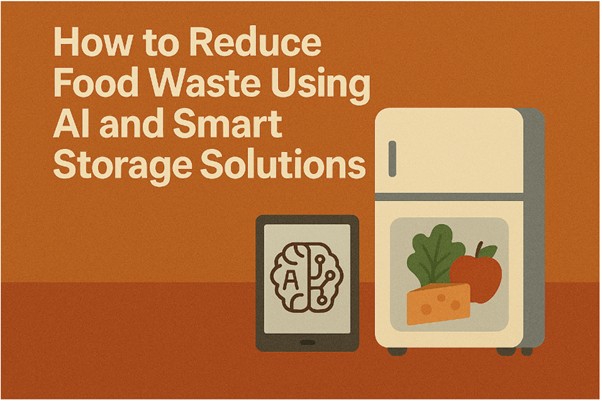
How to Reduce Food Waste Using AI and Smart Storage Solutions
Food waste is more than just an operational issue in the restaurant industry—it’s a financial, environmental, and ethical concern. According to global reports, restaurants waste nearly 10–15% of all food purchased, much of which could be prevented with more intelligent systems. In 2025, cutting-edge technology, particularly artificial intelligence (AI) and innovative storage solutions, is helping restaurants combat this challenge efficiently. Renowned culinary expert Chef Shajahan M. Abdul, founder of Restro Consultants Pvt. Ltd. (RCPL), considers food waste reduction through AI not only intelligent but also essential for long-term success.
So, how exactly can AI and intelligent storage transform restaurant waste management?
The Growing Importance of Food Waste Reduction
Sustainability and efficiency are top priorities for both modern diners and operators. Reducing food waste saves money and strengthens your brand’s reputation. Restaurant consultants at RCPL confirm that businesses actively addressing food waste earn more trust from environmentally conscious customers and staff.
Chef Abdul emphasises, “Every gram of food wasted is a missed opportunity to cut costs, reduce carbon emissions, and show responsibility. The future belongs to restaurants that precisely optimise everything—from sourcing to storage.”
How AI Helps Restaurants Combat
Food Waste
Artificial Intelligence is revolutionising
how restaurants manage inventory, forecast demand, and monitor usage. According
to Chef Shajahan M Abdul, AI enables data-driven decisions that dramatically
reduce over-ordering, spoilage, and unnecessary prep.
1. Predictive Inventory
Management
AI systems analyse historical
sales data, seasonal trends, and current demand patterns to accurately predict
what and how much to order. This prevents over-purchasing and ensures fresh
inventory is used efficiently before spoilage occurs.
Chef Abdul says, “Predictive
inventory powered by AI minimises guesswork. It ensures you’re buying just
enough—and not too much—every time.”
2. Real-Time Expiry Tracking
AI-powered platforms can track
expiry dates across multiple products and alert staff when items are near
expiration. These alerts help shift stock rotation, adjust prep plans, or
develop last-minute specials to use surplus ingredients.
Restaurant consultants at
Restro Consultants Pvt Ltd (RCPL) recommend integrating expiry tracking with
kitchen display systems to prompt staff in real time, reducing avoidable waste.
3. Smart Recipe Adjustments
Based on Stock
Some AI platforms suggest
recipe modifications based on inventory availability and freshness. If a key
ingredient is nearing expiration, the system can recommend menu specials that
incorporate it, creatively reducing waste.
Smart Storage Solutions: The
Silent Game Changer
In tandem with AI, intelligent
storage systems take food waste management to the next level. These systems use
IoT (Internet of Things) sensors, temperature monitors, and intelligent
shelving to ensure optimal storage conditions and real-time visibility.
1. Smart Refrigerators and
Freezers
Innovative cold storage units
automatically monitor temperature and humidity, sending alerts when readings
deviate from safe temperature and humidity ranges. Some even feature auto-adjust
settings to preserve the freshness of specific products.
According to Chef Shajahan M.
Abdul, “Just one unnoticed refrigerator glitch can result in thousands of
dollars lost in spoiled stock.” Innovative systems act like a 24/7 quality
control team.”
2. RFID and Barcode Scanning
for Precise Tracking
Smart shelves equipped with
RFID or barcode scanners track item movements in real time. This eliminates
manual counting errors and enables chefs to use a FIFO (First-In-First-Out)
approach with greater accuracy.
Restaurant consultants from
RCPL regularly assist in implementing these systems in busy kitchens, where
accurate inventory turnover has a direct impact on profit margins.
3. Automated Stock Alerts
Intelligent storage systems
alert kitchen staff when inventory is running low or nearing expiry. These
alerts prevent duplicate purchases and encourage the use of existing items
before introducing new stock.
Chef Abdul suggests integrating
these alerts with the kitchen’s POS system for real-time data synergy.
Combining Tech with Training
and SOPs
Technology is only effective
when paired with proper team training and clear standard operating procedures
(SOPs). AI and intelligent storage must be seamlessly integrated into the daily
workflow to realize their full potential.
Chef Shajahan M Abdul says,
“Smart solutions aren’t meant to replace staff—they’re there to empower them.
Proper training ensures your team uses the tech effectively and consistently.”
Restaurant consultants at
Restro Consultants Pvt Ltd (RCPL) develop custom Standard Operating Procedures
(SOPs) and conduct hands-on training to ensure the smooth, efficient, and
sustainable adoption of technology.
Overcoming Common Challenges
Despite its advantages,
adopting AI and smart storage comes with initial hurdles. These include:
Real-World Success Stories
Restaurants around the
globe—and in India—are already experiencing the benefits of combining AI with
smart storage:
The Future: AI + Sustainability
= Profitability
As AI continues to evolve,
expect even more intelligent solutions to emerge. Future tech will include
automated restocking, AI-integrated compost tracking, and even waste-to-energy
kitchen systems. Sustainable practices powered by tech will not only become
standard—they’ll become expected.
Chef Shajahan M Abdul believes,
“Restaurants that lead with smart waste management today will set the gold standard
for the next decade. It’s not just good for the planet—it’s great for
business.”
Final Thoughts from Chef
Shajahan M Abdul
Reducing food waste isn’t just
an environmental move—it’s a wise business decision. By integrating AI and innovative
storage solutions, restaurants can minimise losses, boost efficiency, and
elevate their brand in the eyes of today’s eco-conscious diners.
As Chef Abdul puts it, “Waste
reduction powered by intelligence is the future of kitchen management. The
faster you adapt, the more you save—and the more your customers trust you.”
With expert guidance from the
restaurant consultants at Restro Consultants Pvt Ltd (RCPL), your restaurant
can confidently adopt these innovations and lead the way in sustainable,
profitable dining.
Chef Abdul © Copyright 2024. All rights reserved.